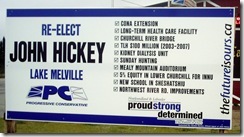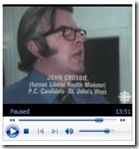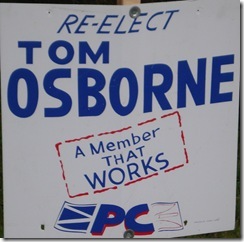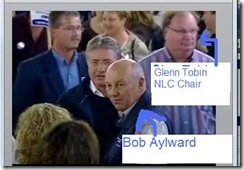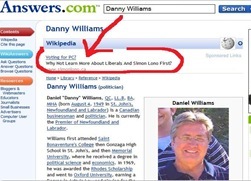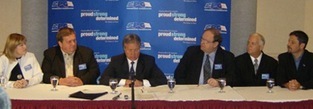NTV/Telelink released the first public opinion poll of the provincial election campaign on Thursday.
The poll of 1583 residents across Newfoundland and Labrador showed some interesting results. Almost half those surveyed (48.7%) gave no answer to the question on which party they would vote for. Of that number, 30.4% were undecided, 14.1% refused to answer and only 4.2% indicated they would not vote.
As reported by NTV, 40.3% intended to vote Progressive Conservative, 7.3% were voting Liberal and 3.6% were voting NDP. Telelink then calculated the responses removing all non-answers and then compares the result to the method used by Corporate Research Associates.
However, this is an odd way of assessing the result. Those who supplied no answer or who indicated they were undecided were not apparently asked follow-up questions to determine any leanings, including whether they might belong in the "will not vote" category. Only 4.2% indicated they would not vote. Therefore, only those who indicated they would not vote should be excluded.
Those adjusted results would be:
| n = 1517 | n | % |
| PC | 638 | 42 |
| LIB | 116 | 7.6 |
| NDP | 57 | 3.7 |
| UND | 481 | 31.7 |
| REF | 223 | 14.7 |
The truly interesting thing about these results is that they potentially show the actual popularity of the current administration versus the poll results using the method of eliminating most of the undecided or no answers.
If you look at the undecideds and those who refused to answer the question, there are actually more people in that pile (46.8%) than are actually openly committed to a governing party that is purported at unprecedented levels of popularity in others polls.
Think about that.
People refuse to answer questions or indicate they are undecided for many reasons. Some have to do with possible perception of the responses, were they to become known. Even though a survey like this one is conducted by telephone, in a small community there may be a concern that confidential information - like voting intentions - will become widely known. A voting intention that goes against the local norm or the perceived local norm mightr be withheld for fear of social repercussions.
But without getting into a range of hypothetical situations, just consider that in a province where the current Premier is supposedly overwhelmingly popular, the undecideds were only 10% less than the decideds giving their voting choice as Progressive Conservative.
Some pollsters and others will use a simple method and allocate the undecideds and refusals in the same way as the decideds. Unfortunately, the statistical arguments used in favour of this approach don't conform with actual experience. In 1999, for example, a poll similar to this one reported undecideds of 30% just before the debate. no more public polls were released but the final tally on voting day suggested that the undecideds broke disproportionately in favour of the opposition Progressive Conservatives under Ed Byrne.
Aside from that, there are a variety of things we don't know about this poll - they aren't reported - that might also affect interpretation of the results. These other details would include the relative percentages of males and females in the final sample, compared to the population and how those segments responded. We also can't account for the relative mix of respondents from the northeast Avalon versus other regions of the province. other demographic would also help to assess the poll results.
What we have here, though, is really just another example of why the media "horse race polls" ultimately don't give those of us outside the political parties any useful information on which to make judgments.
Added to that general reservation must be a question about the interpretation given by NTV in this story. Yes, there is strong Tory support, but the real story - the one with details that begged for better research - is in the undecideds and refuseds.
Maybe local media outlets will start doing better research designs for future elections. They cost a little more but they are so much better for informing audiences.
-srbp-
1. Following is the text of the NTV story, as linked above. Paragraphing has been changed for clarity.
Telelink poll shows strong Tory support, high undecided rate
September 27, 2007
The Progressive Conservatives maintain a large lead halfway through the campaign, although there is still a large undecided vote. That's according to a poll conducted by Telelink and paid for by NTV. On Tuesday and Wednesday, Telelink polled 1,583 residents across the province. Of those, slightly less than half watched Tuesday night’s leaders’ debate. Telelink asked which leader gave the best performance: 40.3% of viewers chose PC Leader Danny Williams, NDP Leader Lorraine Michael came second with 34.4 and only 4.6 chose Liberal Leader Gerry Reid. The rest had no opinion.
The margin of error for that sample was /-3.5 percentage points 19 times out of 20.
Then Telelink asked, "Did the debate influence how you will vote in the election?" 16.1said yes, while 77.8per cent said no.
Finally, Telelink asked respondents how they planned to vote on Election Day: 40.3% said Progressive Conservative, 7.3% said Liberal, and 3.6% cent said NDP.
Among the 48.7% who gave no answer, 30.4 said they were undecided, 14.1 refused to answer, and 4.2 said they will not vote. That was substantially higher than the 24% who were undecided or not voting when Telelink polled voters this time last year. The margin of error for that sample was +/-2.5 percentage points.
However, when the non-answering block is factored out of the results, the numbers are almost identical to the quarterly Corporate Research Associates polls. Among decided voters, 78.6 said they would vote PC, 14.3 would vote Liberal, and 7.1 would vote NDP. The margin of error on that sample is +/-3.4 percentage points.
-30-
2. Related on Bond:
Shaggin' polls
Poll-er magic
Polls and something called a poll
Perils of polls [We asked for the poll report, but nothing ever showed up.]
